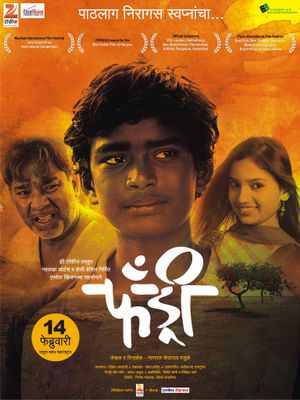Fandry Reviews and Ratings

-
The beauty is that debutant director Nagraj Manjule doesn’t give us a shrill polemic on the soul-crushing ugliness that exists in modern India. Instead he creates a poignant portrait of a keenly intelligent boy whose dreams defy his circumstances. Manjule gives us lovely little details – so Jabya, hoping to go a shade lighter, enthusiastically powders his face before school. And his bright, charming face fills with longing when he sees a pair of jeans, which are prohibitively expensive but essential in his Shalu plans.
-
Nagraj Manjule makes a film with honesty and that is what the global audience connects to. Fandry, which is often misunderstood to be the main lead’s character name is justified in the film. Symbolic representations have always been appreciated in cinema. And the title of this film does something similar.
-
Writer-director Nagraj Manjule, who also makes a charming little cameo as the village oddball, tells us a story with universal appeal, but in a manner that roots it to what he clearly knows best. At a crisp 103 minutes, the film is paced beautifully, and it has a simple guitar piece that is like the soul of the film. Everytime it plays, it seems like a dream – it reminds you that for all us, there’s always something that’s out of reach.
-
Fandry is a must-watch; it’s a rare film that has the screenplay, cinematography, music, dialogue, acting and direction coming together so beautifully.
-
Manjule also offers a vivid, real picture of life in rural Maharashtra. There is Jabya ironing his clothes with the base of a hot glass. Or when the family goes out to collect wood to weave baskets. Proving that is a great storyteller, Manjule especially creates endearing scenes between Jabya and Piraji, who engage in fun and candid conversation about yearnings. Watch out for a lovely dream sequence which both tickles and moves.
-
There are harsh words and scenes in the film but you don’t feel pitiful and that is where Nagraj has scored by getting the message through in a light hearted way without bombarding the viewer with the agony of the characters.
The film, which has won the critic’s appreciation at various film festivals, is a well crafted one and is a sure shot watch for all those interested in knowing more about the problem of caste discrimination.
-
Don’t mistake Fandry for a commercial film. Yes it has its moments of crowd pleasing appeal when a family desperately chases pigs around the village. But you know the comedy is going to give way to a much darker end. This is art cinema at its best. There’s a visceral punch right at the end. And long after you leave the movie theatre, it compels you to think of the irony. And the more you think, the more you feel troubled at the grim conclusion of a fantasy tale. This is easily one of the best films of 2014.
-
It is not very often that when you come out of the theater your mind and heart is racing with so many emotions. Anger, exhilaration, joy, sadness, not necessarily in that order, you feel it all at the same time. Most films nowadays hardly evoke even one those sentiments.
Do yourself a favor and watch Fandry. At the end of it if you don’t feel emotions stirred in you, go and see a doctor immediately.
-
Manjule’s writing is so watertight that every occurrence in the screenplay feels natural. Ultimately,Fandry’s greatest victory is that it flows with the same languid pace one would expect of village life, despite its hardships, and, by putting the viewer in Jabya’s shoes, Manjule let you live in his world for a while.
-
Pain, anguish, aspiration, desire and hope form the soul of Fandry, and it will take me a few re-watches to take in the film completely. A film like Fandry comes along rarely. And when it does, it must be watched and celebrated. GO WATCH NOW.




















